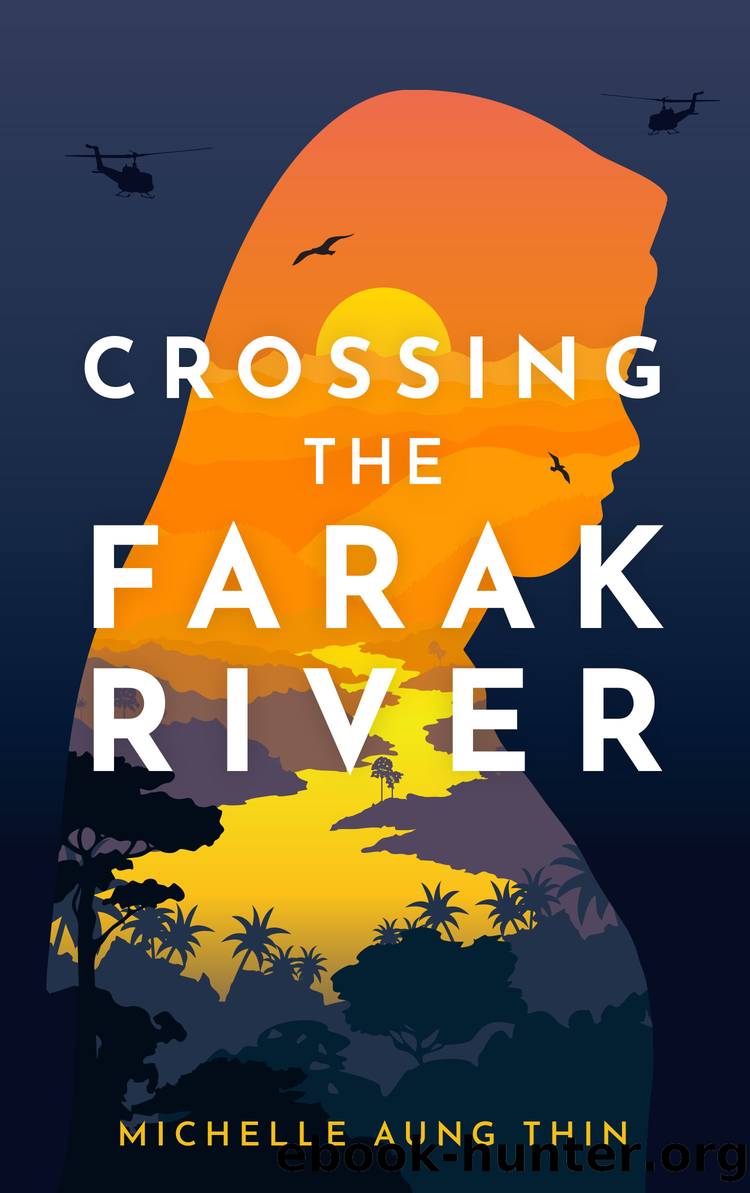Crossing the Farak River by Michelle Aung Thin

Author:Michelle Aung Thin
Language: eng
Format: epub
Publisher: Annick Press
Published: 2020-01-16T20:15:27+00:00
Chapter 18
You are Rohingya. You are a target.
Her uncleâs words wake Hasina early the next morning. She lets the others sleep on. She has thinking to do.
They may be targets, but they still have to eat and drink. And now, they must also make sure the hand phone is charged.
For this they will need to go to the familyâs stall at the bazaar. Mama always charged the phone at the stall, Ghadiya explained the night before. Hasina shiversâthe last time she was there she came face to face with a Sit Tat soldier. Were they right in assuming that no trucks meant no more soldiers? If they are wrong, they could be walking into a trap of their own making.
On the other hand, there is an outside chance that the bazaar will have reopened and they will hear news of their family. A mist of hope films her eyes.
When the others wake, they all set off for the bazaarâthey must stick together. They hide the phone and charger in a dented tiffin tin so they look to all the world like three children bringing lunch to their father. The last thing Hasina and Ghadiya do is leave their numals on Rukiahâs dressing table. Today, they will pass for Arakanese to strangers. As for those who know them? Their neighbors at the bazaar? Farmers in the paddy fields? People theyâve been passing in the street all of their lives? We will just have to hope they donât turn us in, Hasina thinks.
The morning is still cool as they walk along Third Mile Street. All over again, Hasina feels the painful shock of seeing a place once so familiar now so profoundly changed. They stop as they pass Monu Mushâs horns.
âGoodbye, Monu Mush,â Araf whispers, and slips his hand into Hasinaâs.
It may be dangerous to leave the house and walk to the bazaar, but at least the streets of Teknadaung will be familiar, normal. A bit of normal would be good.
When they reach Teknadaung, Hasina finds things here too have changed. The paddy fields around town are still empty of farmers. No Arakanese men sit around talking and spitting betel juice at the ground by the old Portuguese fort. Nobody is in at the International Aid office. Even the police station is quiet. Outside the Basic Education School is a sign: Closed until farther notice. The streets are empty of people apart from an Arakanese family packing up a cart to leave. They move like sleepwalkers, dazed, numb. So it is not just Rohingya who have been affected by the violence, Hasina thinks.
The bazaar entrance is also stillâno women with vegetables spread out on cloths, no muddle of motorcycles and bicycles. The bazaar door, however, is open.
Hasina scans for soldiers. The coast is clear. Before they go in, she and Ghadiya take Araf aside. In a lowered voice, she tests him for the hundredth time.
âWhat language do we speak?â Hasina quizzes him.
âMyanmar language only.â
âAnd the hand phone?â Ghadiya asks.
Araf puts a finger to his lips.
Download
This site does not store any files on its server. We only index and link to content provided by other sites. Please contact the content providers to delete copyright contents if any and email us, we'll remove relevant links or contents immediately.
Machine Learning at Scale with H2O by Gregory Keys | David Whiting(4289)
Never by Ken Follett(3928)
Fairy Tale by Stephen King(3364)
Will by Will Smith(2898)
Fantastic Beasts and Where to Find Them: The Original Screenplay by J. K. Rowling(2495)
It Starts With Us (It Ends with Us #2) by Colleen Hoover(2324)
Can't Hurt Me: Master Your Mind and Defy the Odds - Clean Edition by David Goggins(2316)
The Storyteller by Dave Grohl(2215)
Friends, Lovers, and the Big Terrible Thing by Matthew Perry(2210)
The Becoming by Nora Roberts(2183)
Cloud Cuckoo Land by Anthony Doerr(2085)
New Morning Mercies: A Daily Gospel Devotional by Paul David Tripp(1906)
HBR's 10 Must Reads 2022 by Harvard Business Review(1832)
A Short History of War by Jeremy Black(1831)
The Complete Witcher by Andrzej Sapkowski(1829)
Cytonic by Brandon Sanderson(1828)
Go Tell the Bees That I Am Gone by Diana Gabaldon(1746)
Leviathan Falls (The Expanse Book 9) by James S. A. Corey(1724)
A Game of Thrones (The Illustrated Edition) by George R. R. Martin(1703)
